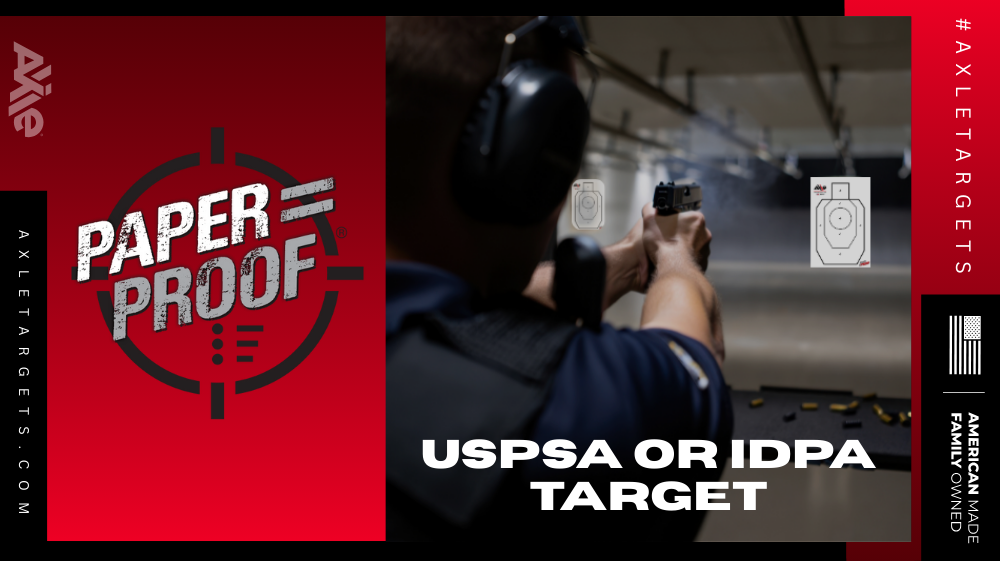Why Picking the Right Targets Matters
When you’re serious about shooting sports like USPSA (United States Practical Shooting Association) or IDPA (International Defensive Pistol Association), practice isn’t just about sending rounds downrange—it’s about building skills that translate directly into competition performance. The targets you choose play a massive role in how effectively you train.
After all, not all paper targets are created equal. Using the wrong style can mean wasted ammo, flawed muscle memory, or even bad habits that show up on match day. The right target, on the other hand, helps you:
-
Train under competition-style conditions.
-
Recognize scoring zones instinctively.
-
Track your accuracy and progress over time.
-
Stay engaged with purposeful practice.
So, how do you pick the best paper targets for USPSA or IDPA practice? Let’s break it down.
USPSA vs. IDPA: What’s the Difference?
If you’re new to competitive shooting, the first step is understanding the two major pistol sports—because they influence the kind of targets you should be practicing on.
-
USPSA: Think speed, movement, and technical shooting. USPSA stages often require fast transitions, shooting on the move, and accuracy under time pressure. Targets usually feature large silhouettes with scoring zones labeled A, C, and D.
-
IDPA: Built to simulate real-world defensive scenarios. IDPA matches emphasize tactics like drawing from concealment, using cover, and engaging multiple threats. The targets reflect this by resembling a humanoid torso with distinct scoring zones.
👉 In short: USPSA rewards pure performance, while IDPA tests your defensive realism. Both require consistent practice on targets that mirror their official designs.
Factors to Consider When Choosing Training Targets
1. Match Similarity
The closer your practice target is to what you’ll see in competition, the better. Training on exact silhouettes makes it second nature to identify scoring zones and aim accordingly.
2. Paper Quality & Durability
Paper targets might seem “one and done,” but quality makes a difference. Thick, durable paper resists tearing and provides crisp bullet holes, making scoring easier. That’s why Axle Targets’ paper products stand out—they’re built to hold up during intense sessions.
3. Feedback & Visibility
Targets should give clear, instant feedback. Whether it’s a clean hit in the scoring ring or an edge shot, visibility helps you correct mistakes quickly.
4. Training Variety
Yes, you need to practice on official-style silhouettes—but variety keeps training fresh. Switching between competition silhouettes, smaller accuracy drills, and even creative targets prevents burnout and helps sharpen your skills in new ways.
Product Spotlights: Axle Targets for USPSA & IDPA
When it comes to paper targets, Axle Targets offers some of the best USPSA and IDPA-compatible options out there. Let’s highlight three that deserve a spot in your training bag.
🔹 3. Travis Mills Foundation Target👉 Shop the Travis Mills Foundation Target here This unique target blends effective training with meaningful impact. Not only does it provide a high-quality paper surface for drills, but proceeds also support the Travis Mills Foundation, helping veterans and their families. Why it’s perfect:
Sometimes training should be fun, and this target adds that extra motivation while giving back to a worthy cause. |
 |
Expert Tips for Smarter Range Training
Choosing the right targets is step one—but how you use them matters just as much. Here are some expert tips to maximize your sessions.
1. Rotate Target Styles
Don’t just stick to one silhouette. Mix IDPA targets for tactical scenarios, USPSA-style for competition drills, and precision targets like the B29 for accuracy. This rotation mimics match unpredictability and sharpens adaptability.
2. Train With Time Pressure
Use a shot timer. Both USPSA and IDPA demand not just accuracy, but speed. Start with untimed accuracy, then add time standards to push performance.
3. Focus on Transitions
Set up multiple targets side by side. Practice smooth, controlled transitions between them—this is where competitions are often won or lost.
4. Practice From Realistic Positions
For IDPA shooters, practice shooting from cover, kneeling, or drawing from concealment. For USPSA, simulate stage movement with lateral steps or forward advances.
5. Track Your Progress
Save shot-up targets or mark them for review. This lets you see improvement over time and identify patterns in misses (low-left? flinch? grip issue?).
Bringing It All Together
So, how do you pick the right targets for USPSA or IDPA practice? Simple—choose ones that align with your goals, match competition styles, and keep training engaging.
Axle Targets makes that choice easy. Whether it’s the official IDPA silhouette, the B29 precision trainer, or the Travis Mills Foundation target for variety, you’ll find the right tools to sharpen your skills.
Training isn’t about sending more rounds downrange—it’s about making every round count. And the right paper target helps you do exactly that.
👉 Explore Axle Targets’ full lineup of paper shooting targets today and elevate your practice for USPSA and IDPA competition.



